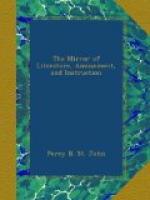[15] “The ink secreted in
this bag has been said to be thrown out
to conceal the animal from its pursuers;
but, in a future
lecture, I shall endeavour to show that this
secretion is to
answer a purpose in the animal economy connected
with the
functions of the intestines.” (Hume’s
Comp. Anat. vol. i.
p. 376.) Dr. Coldstream, in a letter to the
author, detailing
the manners of Octopus ventricosus in captivity,
says, “I have
never seen the ink ejected, however much
the animal may have
been irritated.” I have, however,
been told by our fishermen,
that they have seen this species eject the
black liquid, with
considerable force, on being just taken from
the sea.
[16] Sir B. Sibbald says that the
Loligo, or hose-fish, besides
its ink has another purple juice. (Scot.
Illust. vol. ii.
lib. 3. p. 26.) I find no mention of this
in any other author.
* * * * *
LUXURIANCE OF NATURE.
Upper Louisiana (we are told) has all the trees known in Europe, besides others that are here unknown. The cedars are remarkably fine; the cotton trees grow to such a size, that the Indians make canoes out of their trunks; hemp grows naturally; tar is made from the pines on the sea coast; and the country affords every material for ship-building. Beans grow to a large size without culture; peach trees are heavily laden with fruit; and the forests are full of mulberry and plum trees. Pomegranates and chestnut trees are covered with vines, whose grapes are very large and sweet. There are three or four crops of Indian corn in the year; as there is no other winter besides some rains. The grass grows to a great height, and towards the end of September is set on fire, and in eight or ten days after, the young grass shoots up half a foot high.
P.T.W.
* * * * *
THE GATHERER.
Annual Cost of a Private Soldier.—The daily pay of a foot soldier is one shilling, with a penny for beer; the daily pay of a life-guardsman is 1s. 11-1/2d. and the annual cost is 74l. 4s. 11d. per man, besides horse and allowances, or 1l. 8s. 6d. per week; dragoons, 56l. 11s. 5d. per annum, or 1l. 1s. 9d. per week; footguards 34l. 6s. or 13s. 2d. per week; infantry, 31l. per annum, or 11s. 10d. per week. A regiment of horse soldiers, of about 360, officers and men, cost about 25,000l. per annum. The wages of seamen in the Royal Navy are 2l. 12s. per month, or 13s. per week; and 1l. 12s. or 8s. per week more, are allowed for their provisions.—Examiner.
The Morning Chronicle report of the examination of Mr. Horsley, the Governor of the Bank of England, has the following odd question:—“Is there any large proportion of London noses circulated by the Branch Banks?”—“There are none.”




